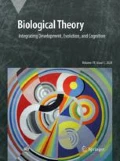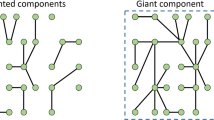Abstract
The evolution and maintenance of cooperation in human and animal societies challenge various disciplines ranging from evolutionary biology to anthropology, social sciences, and economics. In social interactions, cooperators increase the welfare of the group at some cost to themselves whereas defectors attempt to free ride and neither provide benefits nor incur costs. The problem of cooperation becomes even more pronounced when increasing the number of interacting individuals. Punishment and voluntary participation have been identified as possible factors to support cooperation and prevent cheating. Typically, punishment behavior is unable to gain a foothold in a population, while volunteering alone can efficiently prevent deadlocks in states of mutual defection but is unable to stabilize cooperation. The combined effects of the two mechanisms have surprisingly different consequences in finite and infinite populations. Here we provide a detailed comparison of the two scenarios and demonstrate that driven by the inherent stochasticity of finite populations, the possibility to abstain from social interactions plays a pivotal role, which paves the way for the establishment of cooperation and punishment.
Similar content being viewed by others
References
Axelrod R (1984) The Evolution of Cooperation. New York: Basic Books.
Axelrod R, Hamilton WD (1981) The evolution of cooperation. Science 211: 1390–1396.
Boyd R, Gintis H, Bowles S, Richerson P (2003) The evolution of altruistic punishment. Proceedings of the National Academy of Sciences of the USA 100: 3531–3535.
Boyd R, Mathew S (2007) A narrow road to cooperation. Science 316: 1858–1859.
Boyd R, Richerson PJ (1988) The evolution of reciprocity in sizeable groups. Journal of Theoretical Biology 132: 337–356.
Boyd R, Richerson PJ (1992) Punishment allows the evolution of cooperation (or anything else) in sizable groups. Ethnology and Sociobiology 13: 171–195.
Brandt H, Hauert C, Sigmund K (2003) Cooperation, punishment and reputation in spatial games. Proceedings of Royal Society of London B 270: 1099–1104.
Brandt H, Hauert C, Sigmund K (2006) Punishing and abstaining for public goods. Proceedings of the National Academy of Sciences of the USA 103(2): 495–497.
Clutton-Brock TH, Parker GA (1995) Punishment in animal societies. Nature 373: 209–216.
Colman AM (1995) Game Theory and Its Applications in the Social and Biological Sciences. Oxford: Butterworth-Heinemann.
Crow JF, Kimura M (1970) An Introduction to Population Genetics Theory. New York: Harper and Row.
Dawes RM (1980) Social dilemmas. Annual Review of Psychology 31: 169–193.
De Silva H (2008) Interactive simulations. http://www.wu-wien.ac.at/usr/ma/hbrandt/simulations.html.
Dugatkin LA (1997) Cooperation Among Animals: An Evolutionary Perspective. Oxford: Oxford University Press.
Fehr E, Fischbacher U (2004) Third-party punishment and social norms. Evolution and Human Behavior 25: 63–87.
Fehr E, Gächter S (2002) Altruistic punishment in humans. Nature 415: 137–140.
Fehr E, Rockenbach B (2003) Detrimental effects of sanctions on human altruism. Nature 422: 137–140.
Fletcher J, Zwick M (2004) Strong altruism can evolve in randomly formed groups. Journal of Theoretical Biology 228: 303–313.
Fowler JH (2005) Altruistic punishment and the origin of cooperation. Proceedings of the National Academy of Sciences of the USA 102(19): 7047–7049.
Fudenberg D, Nowak MA, Taylor C, Imhof LA (2006) Evolutionary game dynamics in finite populations with strong selection and weak mutation. Theoretical Population Biology 70: 352–363.
Grafen A (1985) A geometric view of relatedness. In: Oxford Surveys in Evolutionary Biology, Vol. 2, 28–89. Oxford: Oxford University Press.
Hamilton WD (1964) The genetical evolution of social behaviour I. Journal of Theoretical Biology 7: 1–16.
Hardin G (1968) The tragedy of the commons. Science 162: 1243–1248.
Hauert C (2001) Fundamental clusters in spatial 2 × 2 games. Proceedings of Royal Society of London B 268: 761–769.
Hauert C (2007) Virtuallabs: Interactive tutorials on evolutionary game theory. http://www.univie.ac.at/virtuallabs.
Hauert C, De Monte S, Hofbauer J, Sigmund K (2002a) Replicator dynamics in optional public goods games. Journal of Theoretical Biology 218: 187–194.
Hauert C, De Monte S, Hofbauer J, Sigmund K (2002b) Volunteering as red queen mechanism for cooperation in public goods games. Science 296: 1129–1132.
Hauert C, Michor F, Nowak M, Doebeli M (2006) Synergy and discounting of cooperation in social dilemmas. Journal of Theoretical Biology 239: 195–202.
Hauert C, Schuster HG (1997) Effects of increasing the number of players and memory size in the iterated prisoner’s dilemma: A numerical approach. Proceedings of Royal Society of London B 264: 513–519.
Hauert C, Traulsen A, Brandt H, Nowak MA, Sigmund K (2007) Via freedom to coercion: The emergence of costly punishment. Science 316: 1905–1907.
Hofbauer J, Sigmund K (1998) Evolutionary Games and Population Dynamics. Cambridge: Cambridge University Press.
Imhof LA, Fudenberg D, Nowak MA (2005) Evolutionary cycles of cooperation and defection. Proceedings of the National Academy of Sciences of the USA 102(31): 10797–10800.
Kagel JH, Roth AE, eds (1995) The Handbook of Experimental Economics. Princeton: Princeton University Press.
Karlin S, Taylor HM (1975) First Course in Stochastic Processes, 2nd ed. London: Academic Press.
Lindgren K (1991) Evolutionary phenomena in simple dynamics. In: Artificial Life II (Langton CG, Farmer JD, Rasmussen S, Taylor C, eds), Vol. X of Proceedings of the Santa Fe Institute Studies in the Sciences of Complexity pp. 295–312. Redwood City, CA: Addison-Wesley.
Maynard Smith J (1964) Group selection and kin selection. Nature 201(4942): 1145–1147.
Moran PAP (1962) The Statistical Processes of Evolutionary Theory. Oxford, UK: Clarendon.
Nakamaru M, Iwasa Y (2006) The coevolution of altruism and punishment: Role of the selfish punisher. Journal of Theoretical Biology 240(3): 475–488.
Nowak MA (2006a) Evolutionary Dynamics. Cambridge, MA: Harvard University Press.
Nowak, MA (2006b) Five rules for the evolution of cooperation. Science 314: 1560–1563.
Nowak MA, May RM (1992) Evolutionary games and spatial chaos. Nature 359: 826–829.
Nowak MA, Sasaki A, Taylor C, Fudenberg D (2004) Emergence of cooperation and evolutionary stability in finite populations. Nature 428: 646–650.
Nowak MA, Sigmund K (1993) A strategy of win-stay, lose-shift that outperforms tit-for-tat in the prisoner’s dilemma game. Nature 364: 56–58.
Nowak MA, Sigmund K (1998) Evolution of indirect reciprocity by image scoring. Nature 393: 573–577.
Nowak MA, Sigmund K (2004) Evolutionary dynamics of biological games. Science 303: 793–799.
Nowak MA, Sigmund K (2005) Evolution of indirect reciprocity. Nature 437: 1291–1298.
Ohtsuki H, Hauert C, Lieberman E, Nowak MA (2006) A simple rule for the evolution of cooperation on graphs and social networks. Nature 441: 502–505.
Olson M (1965) The Logic of Collective Action. Cambridge, MA: Harvard University Press.
Queller DC (1985) Kinship, reciprocity and synergism in the evolution of social behavior. Nature 318: 366–367.
Rockenbach B, Milinski M (2006) Indirect reciprocity resolves the efficiency dilemma of costly punishment. Nature 444: 718–723.
Sigmund K, Hauert C, Nowak MA (2001) Reward and punishment. Proceedings of National Academic Science 98: 10757–10762.
Taylor C, Fudenberg D, Sasaki A, Nowak MA (2004) Evolutionary game dynamics in finite populations. Bulletin of Mathematical Biology 66: 1621–1644.
Taylor P, Jonker L (1978) Game dynamics and evolutionarily stable strategies. Mathematical Biosciences 40: 145–156.
Traulsen A, Claussen JC, Hauert C (2005) Coevolutionary dynamics: From finite to infinite populations. Physical Review Letters 95: 238701.
Traulsen A, Nowak MA (2006) Evolution of cooperation by multilevel selection. Proceedings of the National Academy of Sciences of the USA 103(29): 10952–10955.
Traulsen A, Nowak MA, Pacheco JM (2006) Stochastic dynamics of invasion and fixation. Physical Review E 74: 011909.
Trivers RL (1971) The evolution of reciprocal altruism. Quaterly Review of Biology 46: 35–57.
Yamagishi T (1986) The provision of a sanctioning system as a public good. Journal of Personality and Social Psychology 51: 110–116.
Author information
Authors and Affiliations
Corresponding author
Rights and permissions
About this article
Cite this article
Hauert, C., Traulsen, A., De Silva née Brandt, H. et al. Public Goods With Punishment and Abstaining in Finite and Infinite Populations. Biol Theory 3, 114–122 (2008). https://doi.org/10.1162/biot.2008.3.2.114
Received:
Accepted:
Published:
Issue Date:
DOI: https://doi.org/10.1162/biot.2008.3.2.114




